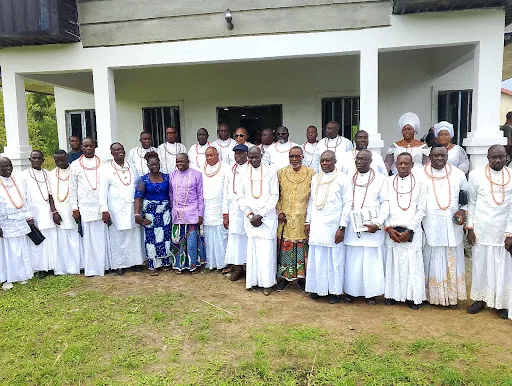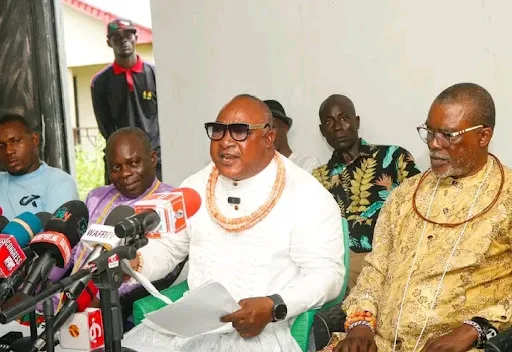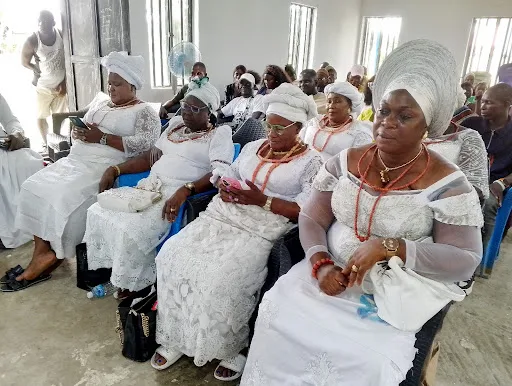Francis Tayor
The People of IJaghala Community, originally known as (Zou-Ala Uba) in Warri South-West Local Government Area of Delta State, have distanced themselves from ltsekiri ethnic nationality as falsely claimed ownership by some group of persons, stressing that they are Ijaws under Gbaramatu Kingdom.
The public declaration was made on Friday, 13th June, 2025 during a press conference organized by the leadership and people of the community jointly signed by Chief Samuel Eyengho, the Tieyemieowei of Gbaramatu Kingdom, Mr. Sunday Akpafunolire, Mr. Willson Abeson, youth President, IJaghala Community, Mrs Grace Remere Ukunorisemofe, Mrs Dolor Utseoritse Laju, Mrs Ebi Jolomi and Mrs Mary Usangbajumi respectively at the Egbegha Town Hall, ljalagha (Zuo-Ala Uba) community in ancient Gbaramatu kingdom.
Responding to the press, Chief Eyengho Samuel, the Tieyemienowei of Gbaramatu Kingdom asserted that ljalagha (Zuo-Ala Uba) community have her ancestral lineage from the ljaws of Gbaramatu Kingdom and not ltsekiri ethnic nationality as earlier falsely claimed by some group of people.
He noted that ljalagha community was founded by Oporoza man named Egbegha, the son of Oweizibiri who later married to an ltsekiri woman from Ugborodo community and gave birth to two children, he stated.
Speaking on behalf of Gbaramatu kingdom, the Fiyeowei of the kingdom, High Chief. Godspower Gbenekama reaffirmed the initial statement of Gbaramatu Kingdom as the original owners of Ijalagha, lkantu, Amadino and Obodo communities, stressing that they will never leave their ancestral homes to any ltsekiri nation.
Gbenekama noted that despite economic reasons as the two ethnic groups trade together over the years does not give ltsekiri people the temerity to lay claim of ljaw communities.
He refers to the ltsekiri people claiming ownership of warri as customary slaves, while calling on the Oba of Benin to come and take his cursed children back to his kingdom.
However, Gbaramatu kingdom has assured ljalagha (Zuo-Ala Uba) people to fastract meaningful infrastructural development to the community in the nearest future, while urging them to be peaceful and law abiding in going about their normal daily business, the Fiyeowei stated.
According to the statement: "We, the undersigned for ourselves and on behalf of the entire people of ljaghala (Zou-Ala Uba) Community in Gbaramatu Kingdom, Warri South West Local Government Area of Delta State, wish to address the press in respect of an age-long
misrepresentation of ljaghala (Zou-Ala Uba) community as an Ugborodo Community
instead of a Community that originated from Gbaramatu Kingdom which was founded
by our ancestors at about the 11th century.
"ljaghala used to be a fishing and palm wine tapping camp of Gbaramatu forebears
before Egbegha was born and prior to the existence of Ugborodo. It has been called
Zou-Ala Uba because of the distance from the entrance to other adjoining creeks and
creeklets.
"Oweizibiri, the father of Egbegha had earlier settled with other ljaw indigenes in Amadino (Omadino) before he left his kinsmen to settle in Ikantu. After several years, Egbegha relocated from Ikantu to Oporoza from where he moved to Zou-Ala Uba and lived permanently.
"Despite the fact that so many great men of Gbaramatu Kingdom
had lived in Zou-Ala Uba and engaged in their natural occupation of fishing, hunting,
and palm wine tapping, Egbegha's permanent stay in Zou-Ala Uba, made him known as the founder of the community. He died as an old man and was buried in Oporoza, the Traditional Hcadquarters of Gbaramatu Kingdom.
After Egbegha had settled at his new found community, he took a wife from Ugborodo by name Erigbawewenimara and the marriage had two children namely
Egogo and Asako. While growing up these children were more closed to their Ugborodo mother who spoke Itsekiri dialect with them. In turn, Egogo also married
Itsekiri women and brought them to ljagbala (Zou-Ala Uba), Egogo through his marriage gave birth to a number of children, who also spoke Itsekiri dialect.
"This is how the Itsekiri dialect became spoken by some of Ijaghala people and thus the community became affiliated to Itsekiri ethnic group.From the above, without mincing words Ijaghala (Zou-Ala Uba) is an Ijaw community in Gbaramatu Kingdom, Warri South West Local Government Area, Delta State.
"The general Public, Local government, Federal-Government and the International Community should take note that Ijaghala (Zou-Ala Uba) community in Gbaramatu Kingdom is an jaw community and is never, was never and will never be part of
Itsekiri ethnic nationality.
"This press conference is in tandem with our earlier
publication made by ljaghala elders about the history of ljaghala people publíshed
(Sunday Vanguard Page 20, November 2, 2008).
"To our greatest dismay, some of the descendants of Egbegha and Egogo still engage in alienating their paternal ancestral Gbaramatu land to their maternal Ugborodo Community.
We strongly condemn the attitudes of these persons which has been causing problems among our kiths and kin in Oporoza community, Gbaramatu
Kingdom and the larger Ijaw nation.
From the foregoing, we want to categorically state and inform the general public, local, state, federal governments and the international community that Iljaghala
(Zou-Ala Uba) community having an ancestral lineage with Gbaramatu kingdom in
Warri South West Local Government Area, Delta State and will continue to affirm and
remain in the traditional institution of Gbaramatu kingdom.
Finally, we hereby pledge our loyalty and allegiance to His Royal Majesty, Oboro Gbaraun ll (JP), Aketekpe, Agadagba, the Pere of ancient Gbaramatu Kingdom", the statement added.
Thank you and God bless.
"Long live Ijoghala (Zou-Ala Uba) community
Long live Gbaramatu Kingdom
Long live Delta State
Long live Nigeria.












No comments:
Post a Comment